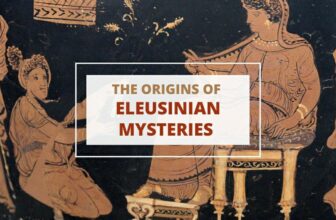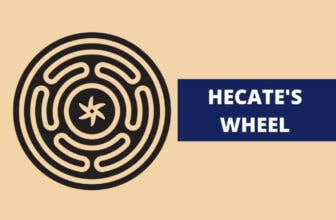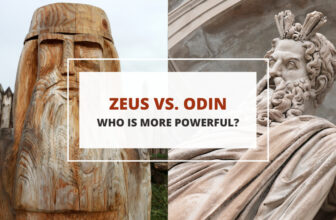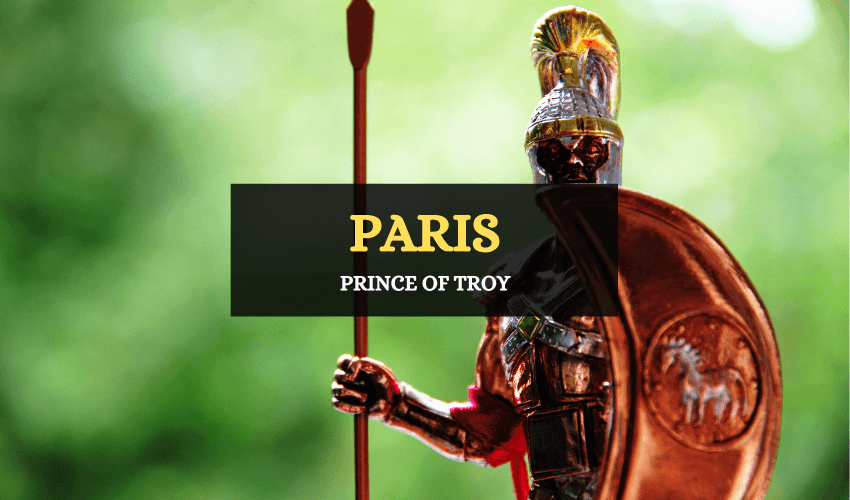
Table of Contents
Deucalion was the son of the Titan Prometheus in Greek mythology and the Greek equivalent of the Biblical Noah. Deucalion is closely connected with the deluge myth, which featured a great flood sent to destroy humanity. He survived with his wife, Pyrrha, and they became the first king and queen of the northern regions of ancient Greece. The tale of their survival and repopulation of the Earth is the most important myth with which Deucalion is connected.
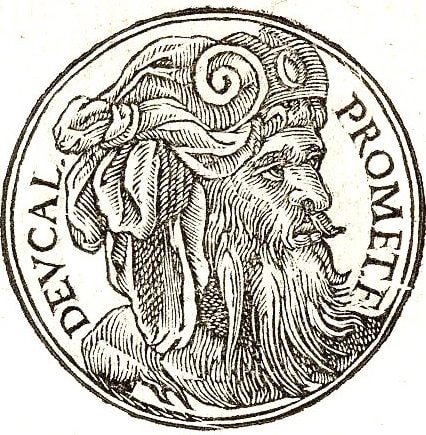
The Origins of Deucalion
Deucalion was born to Prometheus, a Titan god, and his wife, the Oceanid Pronoia, who was also known as Asia. According to certain other sources, his mother was Clymene or Hesione, who were Oceanids as well.
Deucalion married Pyrrha, the mortal daughter of Pandora and the Titan Epimetheus, and together they had two children: Protogenea and Hellen. Some say they had a third child as well, whom they named Amphicyton. After they were married, Decalion became the king of Phthia, a city located in ancient Thessaly.
The End of the Bronze Age
Deucalion and his family lived in the Bronze Age which was a troubled time for humans. Thanks to Pandora who had opened her wedding gift and looked inside it, evil had been released into the world. The population was increasing steadily and people were becoming more wicked and impious by the day, forgetting the purpose of their existence.
Zeus watched what was happening in the world and he was displeased at all the evil he could see. For him, the final straw was when the Arcadian King Lycaon killed one of his own children and had him served up as a meal, simply because he wanted to test the powers of Zeus. Zeus was so angry, he turned Lycaon and the rest of his sons into wolves and decided that the time had come for the Bronze Age to end. He wanted to wipe out all of humankind by sending a great flood.
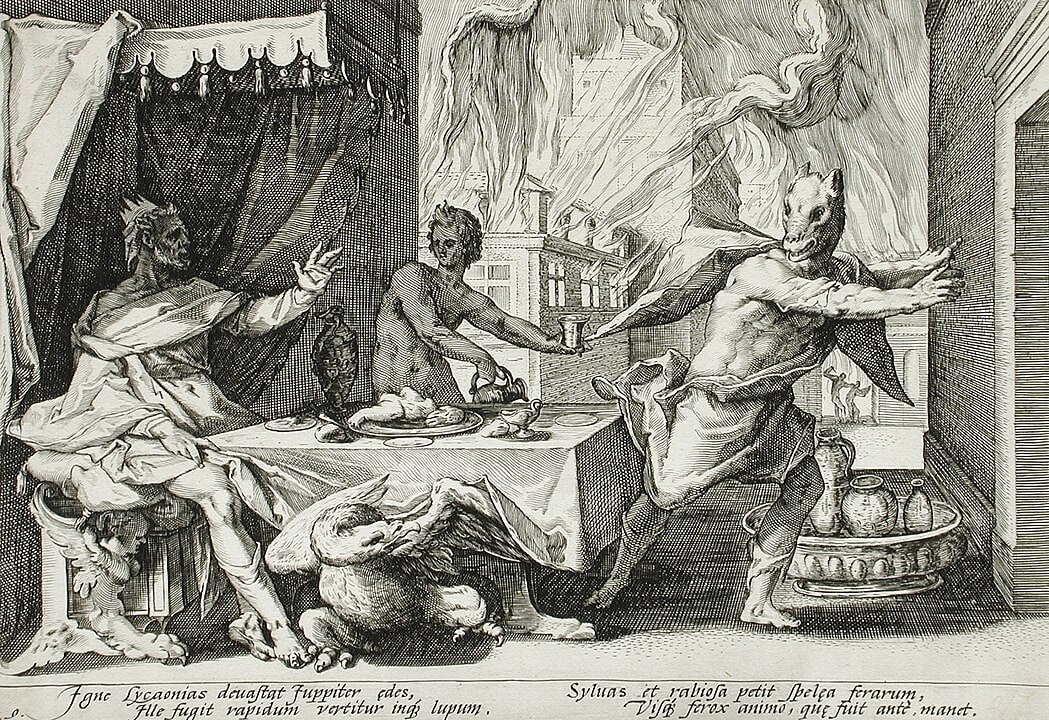
The Great Flood
Prometheus, who had foresight, knew of Zeus’ plans and he warned his son Deucalion beforehand. Deucalion and Pyrrha built a giant ship and filled it up with food and water to last them for an indefinite period, since they didn’t know how long they’d have to live inside the ship.
Then, Zeus shut off Boreas, the North Wind and allowed Notus, the South Wind, to bring forth rain in torrents. The goddess Iris helped by feeding the clouds with water, creating even more rain. On Earth, the Potamoi (the gods of streams and rivers), were allowed to flood all the land and things continued this way for several days.
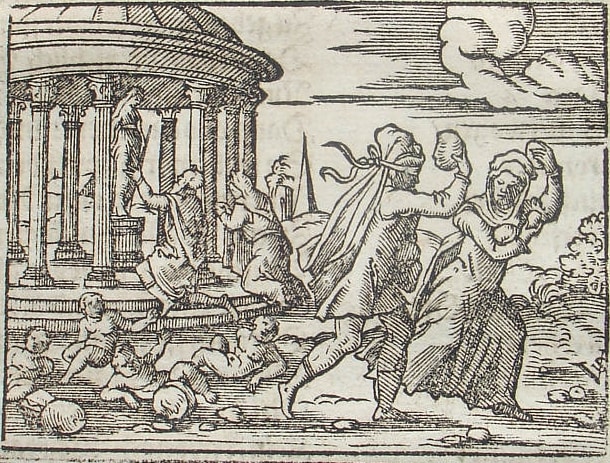
Gradually, the water levels rose higher and soon the entire world was covered in it. There was not a single person to be seen and all the animals and birds had died as well, since they didn’t have anywhere to go. Everything was dead, except for the sea life which seemed to have been the only thing that flourished. Deucalion and Pyrrha also survived since they had boarded their ship as soon as the rain began to fall.
The End of the Flood
For about nine days and nights Deucalion and his wife stayed within their ship. Zeus saw them, but he felt that they were pure of heart and virtuous so he decided to let them live. Finally, he stopped the rain and the flooding and the water began to gradually recede.
As the water levels went down, Deucalion and Pyrrha’s ship came to rest on Mount Parnassus. Soon, everything on Earth was back to the way it had been. Everything was beautiful, clean and peaceful. Deucalion and his wife prayed to Zeus, thanking him for keeping them safe during the flood and because they found themselves completely alone on in the world, they asked him for guidance on what they should do next.
The Repopulation of the Earth
The couple went to the shrine of Themis, the goddess of law and order, to make offerings and pray. Themis heard their prayers and told them that they were to cover their heads as they walked away from the sanctuary, throwing their mother’s bones over their shoulders.
This didn’t make much sense to the pair, but they soon understood that by ‘bones of their mother’, Themis meant the stones of Mother Earth, Gaia. They did as Themis had instructed and began throwing stones over their shoulders. The stones which Deucalion threw turned into men and those thrown by Pyrrha turned into women. Some sources say that it was actually Hermes, the messener god, who told them how to repopulate the Earth.
Plutarch and Strabo’s Theories
According to the Greek philosopher Plutarch, Deucalion and Pyrrha went to Epirus and settled in Dodona, said to be one of the oldest Hellenic Oracles. Strabo, also a philosopher, mentioned that they lived in Cynus, where Pyrrha’s grave can be found to this day. Deucalion’s was found in Athens. There are also two Aegean islands that were named after Deucalion and his wife.
Deucalion’s Children
In addition to their children who were born of stones, Deucalion and Pyrrha also had three sons and three daughters born the regular way. Their sons all became famous in Greek mythology:
- Hellen became the ancestor of the Hellenes
- Amphictyon became the king of Athens
- Orestheus became the king of the ancient Greek tribe, the Locrians
Deucalions daughters all became Zeus’ lovers and as a result, they had several children by him.
- Pandora II became the mother of Graecus and Latinus who were the eponyms of the Greek and Latin people
- Thyla gave birth to Macdeon and Magnes, the eponyms of Macedonia and Magnesia
- Protogenia became the mother of Aethilus who subsequently became the first king of Opus, Elis and Aetolus
Parallels With Other Stories
Deucalion and the great deluge resembles the famous Biblical story of Noah and the flood. In both cases, the purpose of the flood was to rid the world of its sins and bring forth a new human race. According to the myth, Deucalion and Pyrrha were the most righteous among all men and women on earth which is why they were chosen to be the only survivors.
In the Epic of Gilgamesh, a poem from ancient Mesopotamia often viewed as the second oldest religious text to have survived the test of time (the oldest is the Pyramid Texts of Egypt), there is mention of a great flood. In it, the character Utnapishtim was asked to create a giant ship and was saved from the ravages of the floods.
Wrapping Up
Deucalion mainly appears in connection to the story of the great flood. However, the fact that it was him and wife who completely repopulated the earth, with many of their children becoming the founders of cities and peoples, indicates that his role was important. The parallels with myths from other cultures demonstrates how popular the trope of the great flood was at the time.




